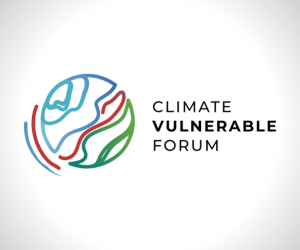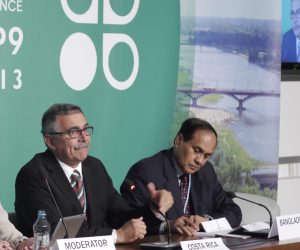The CVF Vision

THE CLIMATE VULNERABLE FORUM VISION
Outcome document of the CVF High Level Meeting at Marrakech, Morocco (UNFCCC COP22) on Friday 18 November 2016.
The response to climate change is climate justice and social justice in action. In partnership and with the support of the international community, we aim to survive and thrive in a world where, as soon as possible and at the latest by 2030 to 2050:
- The dangers of climate change are kept to an absolute minimum.
In our action, we must address underlying causes of disaster risk and climate vulnerability. This requires limiting to the maximum the increase in warming below, if not well below, 1.5 degrees Celsius, a peaking of global emissions by 2020 at the latest, and the achievement of net carbon neutrality by the 2050s in realization of the Paris Agreement.
Member Actions:
- Further to our declaration to commence greening our economies as our contribution towards achieving net carbon neutrality, and recalling our agreement to strengthen our own national climate actions in order to lead processes to help trigger increased commitments from all countries for urgent progress towards the 1.5°C limit, and anticipating both the 2018 IPCC special report on 1.5 degrees and the 2018 facilitative dialogue to take stock of the collective efforts in relation to progress towards the long-term goal, we commit, in the context of the provision of probust and predictable support, to:
- Update our NDCs as early as possible before 2020 emphasizing that additional enabling support on means of implementation is indispensable to any upscaled mitigation and adaptation action by our countries, while recognizing that some NDCs have adaptation components;
- Prepare mid-century, long-term low GHG development strategies as early as possible before 2020, connecting our short, medium and long term development pathways as we strive to limit warming to 1.5 degree Celsius or below, while adapting to the impacts of climate change, to the best of our restricted capabilities.
- In order to maximize the chances of keeping emissions compliant with limiting to the maximum the increase in warming below if not well below 1.5 degrees Celsius, we agree to:
- Promote the full implementation of the 2016 Amendment to the Montreal Protocol;
- Work towards joining the voluntary emissions regulations framework under the International Civil Aviation Organizations;
- Promote effective regulation of international maritime emissions through the International Maritime Organization.
- Maximum advantage is taken of the benefits of climate action.
Member Actions:
- We strive to meet 100% domestic renewable energy production as rapidly as possible, while working to end energy poverty and protect water and food security, taking into consideration national circumstances.
- Pledge to help each other with our respective transition plans to transform our energy, transport and other sectors, and together ensure support is made available in terms of capacity building, financing and technology.
- For protection from growing dangers even with only 1.5 degrees Celsius of warming that will disadvantage the most vulnerable, maximal resilience is achieved for people, indigenous groups, livelihoods, infrastructure, cultures and ecosystems.
Member Actions:
- We commit to the urgent implementation of ambitious National Adaption Plans through the provision of means of implementation, in line with the Paris adaptation goal, promoting adaptation action at local level fully integrated with our national development strategies as a way of minimizing loss and damage resulting from slow onset and extreme events.
- We aim to strengthen participatory local risk governance and encourage members to actively engage with the G7 initiative on climate risk insurance that aims to increase access to direct or indirect insurance coverage against the impact of climate change for up to 400 million people by 2020, and thereafter aim to extend insurance coverage to every community within the territories of our members.
- In embarking on a new era of the pursuit of development, ending poverty, leaving no person behind, and protecting the environment, not only are all Sustainable Development Goals and the targets and priorities of the Sendai Framework for Disaster Risk Reduction achieved by 2030 but also, where possible, their targets are exceeded or their early achievement is accomplished.
Member Actions:
- We commit to advocate together for an international cooperative system fully equipped to address climate change and provide adequate support for climate change mitigation and adaptation action to developing countries –engaging all countries, the United Nations system, international financial institutions and other global governance structures, especially the G20 and the World Bank, with a particular initial focus on protecting food production and the domains outlined in our 2016-2018 Road Map: agriculture, education, health, human rights, gender, labour migration/displacement, science, tourism and water.
- Pledge to ensure our people are effectively informed about climate change and how to address it and equipped as communicators of climate risks and actions, promoting a whole-of-society and whole-of-government approach in pursuit of sustainable development and the convergence of all key stakeholders, both private and government and civil society.
- As least developed and low- and middle-income developing countries, we emerge as wealthy nations achieved through strongest possible economic growth.
Member Actions:
- We will pursue the V20 2020 Action Plan focused on attaining a significant increase in climate investment in our countries public and private climate finance from wide ranging sources, including international, regional and domestic mobilization, and support further investment milestones in continued promotion of transformation in the economic environment for fighting climate change.
- Noting the V20 commitment to working to establish pricing regimes, we will consider and share experiences on ways of effectively and fairly using such instruments.
- We strive to eliminate high-carbon investments and harmful subsidies, including through enhancing enabling environments both at the international and national levels so as to decarbonise the global economy rapidly.
We will monitor and report on the progress of our individual member, and collective, efforts to realize this vision on an annual basis.
Done at Marrakech, Morocco, 18th November 2016


